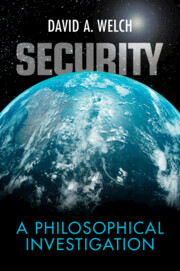
- Publisher:
- Cambridge University Press
- Online publication date:
- August 2022
- Print publication year:
- 2022
- Online ISBN:
- 9781009270113

How do we know when we are investing wisely in security? Answering this question requires investigating what things are worth securing (and why); what threatens them; how best to protect them; and how to think about it. Is it possible to protect them? How best go about protecting them? What trade-offs are involved in allocating resources to security problems? This book responds to these questions by stripping down our preconceptions and rebuilding an understanding of security from the ground up on the basis of a common-sense ontology and an explicit theory of value. It argues for a clear distinction between objective and subjective security threats, a non-anthropocentric understanding of security, and a particular hierarchy of security referents, looking closely at four in particular-the ecosphere, the state, culture, and individual human beings. The analysis will be of interest not only to students and scholars of International Relations, but also to practitioners.
‘This book offers a masterclass in understanding the meanings and implications of the concept of security, taking the reader on a deep intellectual journey into the underpinnings of this fundamental concern. Welch converses with the reader as he challenges convention and forces us to reconsider what it means to be ‘secure’ and therefore how to assess and understand insecurity. Beautifully written, the movement between philosophical and theoretical discussion and carefully rendered empirical materials provides the reader with remarkable insight into this most basic concept in both the scholarship and praxis of world politics.’
David Dewitt - University Professor Emeritus, York University
‘David Welch’s thought-provoking Security: A Philosophical Investigation is deeply engaging, beautifully written, and profoundly original. Truly, a unique, very timely book! Welch masterfully builds on arguments drawn from a wide variety of fields and brings everything together elegantly and persuasively. The book will surely become a must-read for international security students and scholars alike.’
Alexandra Gheciu - Professor of Public and International Affairs, University of Ottawa
‘At a moment of profound insecurity, David Welch has written a deep, thought-provoking, and compelling book. His clear-headed philosophical and empirical discussion is wise even in those passages that fail to fully convince. For he is willing to tolerate ambiguities of argumentation and findings that define choice in a world steeped in uncertainty.’
Peter J. Katzenstein - Walter S. Carpenter, Jr. Professor of International Studies, Cornell University
‘David Welch has produced a clearly written, cogently argued, politically radical, and utterly compelling exploration of the meaning of security. He makes the case for extending it beyond the physical protection of borders and people to protection of the ecosphere in which humanity resides, and the cultures and identities that give life meaning. The book foregrounds post-material sensibilities that ought to guide foreign policy and the study of international relations.’
Richard Ned Lebow - Professor of International Political Theory, King’s College London
'Recommended.'
W. J. Coats Source: Choice
 Loading metrics...
Loading metrics...
* Views captured on Cambridge Core between #date#. This data will be updated every 24 hours.
Usage data cannot currently be displayed.